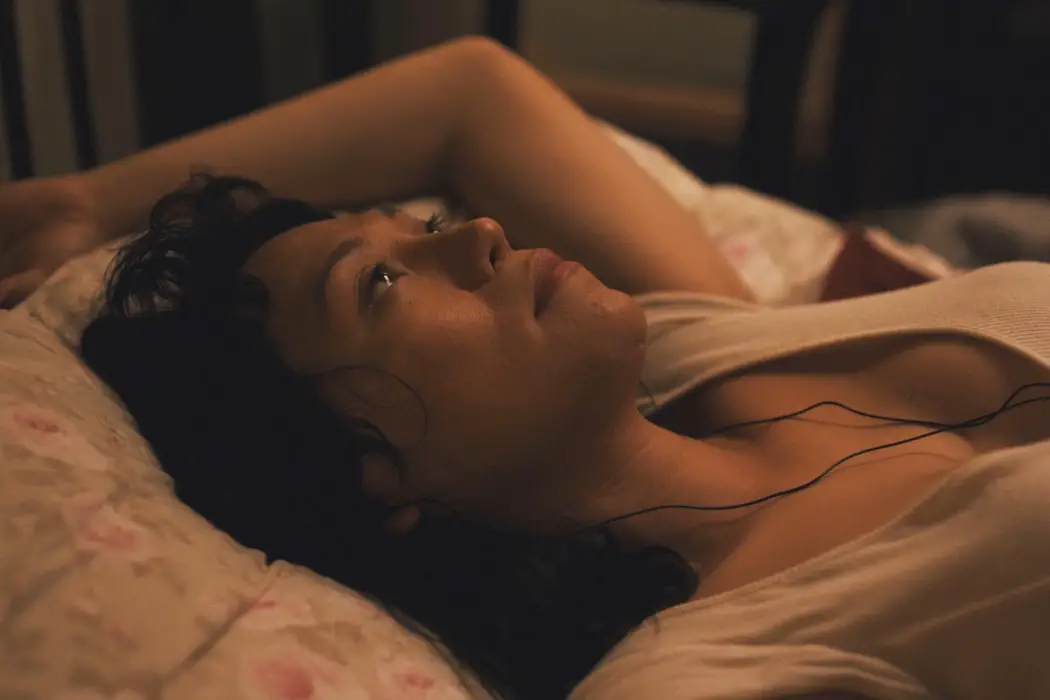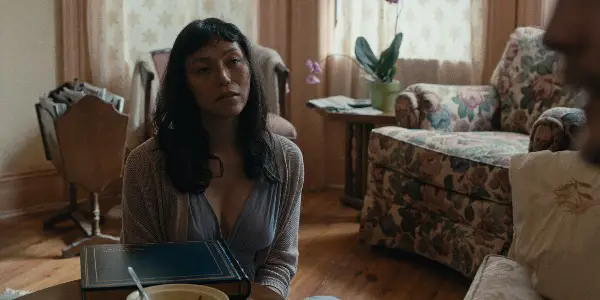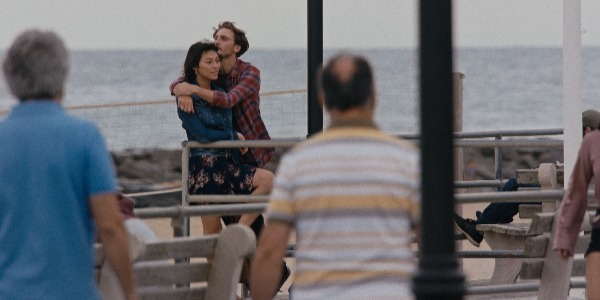LÍNGUA FRANCA: A Tender, Intimate Portrait Of Contemporary US

Rafaela Sales Ross is a proud Brazilian currently living in…
“People will know that you can’t just smuggle in, hunker down, and wait to be legalised”. Trump’s blatantly racist remarks play on the background while Olivia (Isabel Sandoval) quietly eats her breakfast. She faces the living, tired map of many concerns severely amplified by the shouting man. Trump’s words come back to hunt Olivia throughout the whole of Lingua Franca, from his infamous 2016 Phoenix Immigration Speech (“It’s our right, as a sovereign nation, to choose immigrants that we think are the likeliest to thrive and flourish and love us”) to shabby reproductions of hate speech replicated by equally loud and prejudiced young men.
Working as a caretaker for Olga (Lynn Cohen), an elderly Russian woman, Olivia meticulously splits her earnings between a monthly allowance to her mom in the Philippines and saving for a meaty fee reserved for a green card marriage. When Olga’s deadbeat grandson Alex (Eamon Farren) moves into the apartment where the two women live, Olivia sees lust grow into affection despite the young man’s constant display of bright red flags.

Lingua Franca is almost voyeuristic. With Sandoval spreading herself between acting, directing, writing, editing, and producing, the film is inherently intimate. As Olivia shuts herself into her room, a rare haven amidst a city that increasingly resembles a minefield, her chest is finally allowed the deep exhale granted by a sliver of protection. Carefully running her hands alongside her body, the caretaker tenderly trails every piece of skin, diving into a pleasure she knows is fleeting. Sandoval’s feature is at its best when it turns sensuality into confession, the camera drifting between legs, lips, and hair, moans almost turning into cries.
A painful state of limbo
As an undocumented transgender woman, Olivia’s existence is a painstaking limbo between her home country, which openly threatens her life, and the country she chose to call home, which seems to want nothing more than to send her back. Brutal in its subtlety, Língua Franca is a harrowing portrait of not only Trump’s America but also Duterte’s Philippines. Respectively elected in 2016, the two men share harmful beliefs that spread like wildfire, conservative values that actively endanger the lives of many and steer society back years and years. Sandoval turns personal into universal with a narrative that focuses on the gruelling anxiety of knowing someone can knock on your door or – more realistically – burst into your home and take away everything you struggled to build. In a second, reality is suspended and the future becomes nothing but undefined bleakness.
The heaviness of words
“I’ll marry you,” Alex drunkenly whispers into Olivia’s ears, a promise so kind and yet so cruel. Having been through three failed marriage attempts, Olivia’s fairytale-ish moment is tainted by the heavyweight of bureaucracy. The sweetest of the words instantly translated into technical lingo. Here, the idea of marriage as a transaction is taken up a notch; a woman’s destiny tied tightly onto the hands of a man whose life has been nothing but reckless claims and broken vows.

At the happily ever after turn of her dysfunctional love story, Olivia regains the ability to make a choice, even if it means turning away from a proposition that could cease a tiring, incessant sprint. Sandoval opts for a subtle, diluted resolution that feels slightly half done yet corresponds to all the unanswered questions that lingered throughout a journey that shelters itself from the past while avoiding to consider an even grimmer future. Frightful is to know the present is the only choice left.
Have you seen Língua Franca? What did you think? Let us know in the comments below!
Língua Franca was released in select theaters and on Netflix on August 26, 2020.
Watch Língua Franca
Does content like this matter to you?
Become a Member and support film journalism. Unlock access to all of Film Inquiry`s great articles. Join a community of like-minded readers who are passionate about cinema - get access to our private members Network, give back to independent filmmakers, and more.
Rafaela Sales Ross is a proud Brazilian currently living in Scotland. She has a Masters in Film and Visual Culture, and has been diving deep into the portrait of suicide on film for a few years now. Rafa, as she likes to be called, loves Harold and Maude, The Before Trilogy, The Broken Circle Breakdown, Kleber Mendonça Filho and pretty much anything with either Ruth Gordon or Javier Bardem in it. You can find her on both Twitter and Letterboxd @rafiews













